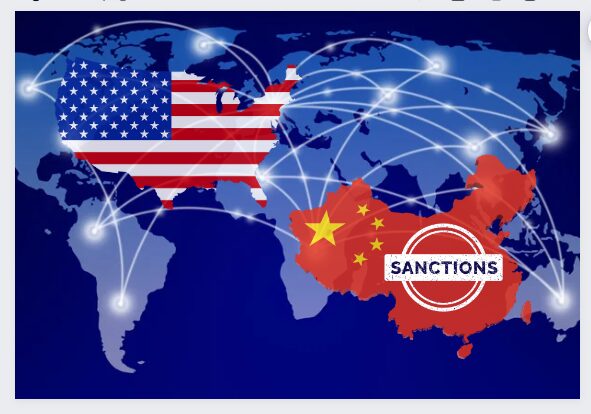United States Sanctions New Chinese Companies
Yesterday, the United States Treasury initiated sanctions against many Chinese companies and individuals in an effort “to further degrade Russia’s ability to sustain its war machine, continuing a multilateral campaign to limit the Kremlin’s revenue and access to the materiel it needs to prosecute its illegal war against Ukraine.” The Treasury Department’s press release regarding these new sanctions can be found here.
This is a significant development, and it should be a wake-up call for businesses worldwide about the risks of doing business with China and with potentially sanctioned parties.
This blog post aims to dissect these developments, elucidate the risks involved, guide businesses on compliance international trade strategies, and emphasize the importance of legal expertise in international trade.
Understanding the New Sanctions
The sanctions announcement by the U.S. Treasury marks a pivotal moment, aiming to throttle the China-Russia “support network” sustaining Russia’s military capabilities. By targeting nearly 300 entities, including many Chinese companies and individuals, the U.S. seeks to tighten controls over Russia’s operational capacities amid the ongoing conflict with Ukraine.
The Complexities of Screening for Prohibited Parties
When doing business with Chinese companies, it’s crucial to be aware of the risks associated with prohibited parties under U.S. export control and sanctions laws. The U.S. has strict regulations prohibiting engagement with certain foreign individuals and entities, including those listed on the Treasury Department’s SDN (Specially Designated Nationals) List and the Commerce Department’s Entity List, Denied Persons List, and Military End-User List. Moreover, import restrictions apply to products from China’s Xinjiang Uyghur Autonomous Region (XUAR) under the Uyghur Forced Labor Prevention Act (UFLPA).
Prohibited party screening requires more than just verifying names against lists; it requires extensive checks. For example, under OFAC’s “fifty percent rule,” any company owned 50% or more by an SDN List party is also blocked.
Implications for Companies That Do Business with Chinese Entities
The freshly imposed sanctions against Chinese companies highlight an urgent need for businesses to reassess their international engagements, particularly with Chinese companies:
1. Legal and Financial Risks. Engaging with newly sanctioned entities, or those potentially to be sanctioned, could lead to severe penalties, disrupting operations and affecting financial health.
2. Reputational Risks. Associations with sanctioned entities can damage a company’s reputation, affecting consumer trust and future business partnerships.
3. Operational Risks. Global supply chains may inadvertently include sanctioned parties, leading to logistical and legal complications.
Proactive Measures to Ensure Compliance
Given the dynamic nature of sanctions and potential additions to the list, businesses must take proactive compliance steps. We recommend some combination of the following:
1. Immediate Due Diligence. Conduct thorough due diligence to ensure that your company has no current engagements with sanctioned or at-risk entities, including those recently named. This should be an ongoing process reflecting the latest sanctions updates.
2. Enhanced Compliance Programs. Establish compliance programs tailored to these new developments, ensuring all employees understand the implications of non-compliance.
3. Engagement with Legal Experts. Consulting with international trade lawyers is crucial. These lawyers can help your company navigate complex sanctions, offer tailored legal advice, and help implement effective compliance strategies.
4. Regular Audits and Monitoring. Continuously audit and monitor business engagements to ensure compliance with international sanctions.
5. Strategic Contingency Planning. Develop contingency plans for critical supply chains to mitigate potential disruptions from future sanctions.
Penalties for Non-Compliance and Due Diligence Methodology
Non-compliance with U.S. Treasury sanctions can lead to severe penalties, including fines up to $1 million per violation under EAR and OFAC regulations, and a complete import ban under the UFLPA.
Businesses can mitigate these risks by, among other things, doing the following:
- Requesting compliance certifications from foreign counterparties. You should seek to obtain such certifications from the Chinese companies with which you do business.
- Including compliance clauses in contracts. It is advisable to check whether your agreements with Chinese companies include these clauses.
- Conducting independent due diligence reviews of the parties involved in transactions, focusing on shareholder identities, business activities, and potential connections to restricted sectors or practices. With so many Chinese companies in financial trouble, securing a due diligence report on your Chinese counterparties can also help prevent your company from paying money and getting nothing in return. See e.g., No Product from China Despite Having Paid for It.
Conclusion
Yesterday’s announcement of new sanctions targeting Chinese entities underscores the volatile nature of global trade amid escalating geopolitical tensions. As relations between China and the Western world continue to strain, and with the ongoing intensification of the war in Ukraine, businesses should begin now to prepare for the ladditional sanctions impacting additional Chinese companies. This evolving situation necessitates a vigilant and informed approach to Chinese engagements.
It is imperative for companies to reassess their China risk management strategies and ensure that their compliance frameworks are robust and adaptable to rapid changes. This includes not only staying updated on the latest developments in sanctions against Chinese companies, but also understanding the broader implications these may have on the global supply chain and international relations.
For more on what you can do to avoid getting in trouble with the U.S. Government for doing business with sanctioned Chinese companies (and their owners), check out Prohibited Party Screening and the Hidden Dangers in China Business Transactions.

